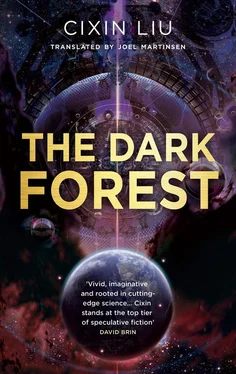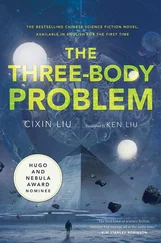“That’s all in the past….”
Down on the formation, the ant wanted to turn toward the sky, but then discovered another trough ahead of it, identical to the “9”-shaped trough it had crawled through before the “7.” So it continued horizontally through the “9,” which it found better than both the “7” and the “1.” although it could not say exactly why. Its aesthetic sense was primitive and single-celled. The indistinct pleasure it had felt upon crawling through the “9” intensified. A primitive, single-celled state of happiness. These two spiritual monocells, aesthetics and pleasure had never evolved. They had been the same a billion years ago, and would be the same a billion years hence.
“Xiao Luo, Dong Dong often spoke of you. She said you’re in… astronomy?”
“I used to be. I teach college sociology now. At your school, actually, although you had already retired when I got there.”
“Sociology? That’s a pretty big leap.”
“Yeah. Yang Dong always said my mind wasn’t focused.”
“She wasn’t kidding when she said you’re smart.”
“Just clever. Nothing like your daughter’s level. I just felt astronomy was an undrillable chunk of iron. Sociology is a plank of wood, and there’s bound to be someplace thin enough to punch through. It’s easier to get by.”
In the hope of reaching another “9,” the ant continued its horizontal advance, but the next thing it encountered was a perfectly straight horizontal like the first trough, except longer than the “1” and turned on its side. And no smaller troughs at the ends. A “–” shape.
“You shouldn’t put it like that. It’s a normal person’s life. Not everyone can be Dong Dong.”
“I really don’t have that kind of ambition. I drift.”
“I’ve got a suggestion. Why don’t you study cosmic sociology?”
“Cosmic sociology?”
“A name chosen at random. Suppose a vast number of civilizations are distributed throughout the universe, on the order of the number of detectable stars. Lots and lots of them. Those civilizations make up the body of a cosmic society. Cosmic sociology is the study of the nature of this supersociety.”
The ant had not crawled very much farther along the formation. It had hoped, after crawling out of the “–” depression, to find a pleasurable “9,” but instead it encountered a “2,” with a comfortable initial curve but a sharp turn at the end that was as fearsome as that of the “7.” The premonition of an uncertain future. The ant continued onward to the next trough, a closed shape: “0.” The path seemed like part of a “9,” but it was a trap. Life needed smoothness, but it also needed direction. One could not always be returning to the point of origin. This, the ant understood. Although there were still two more troughs up ahead, it had lost interest. It turned vertically again.
“But… ours is the only civilization we know of right now.”
“Which is why no one’s done it before. The opportunity is left to you.”
“Fascinating, Dr. Ye. Please go on.”
“My thinking is that this can link your two disciplines together. The mathematical structure of cosmic sociology is far clearer than that of human sociology.”
“Why do you say that?”
Ye Wenjie pointed at the sky. Twilight still illuminated the west, and they could still count the stars that had come out, making it easy to remember how the firmament had looked a few moments ago: a vast expanse and a blue void, or a face without pupils, like a marble statue. Now, though the stars were few in number, the giant eyes had pupils. The void was filled. The universe had sight. The stars were tiny, just single twinkling points of silver that hinted at some unease on the part of its creator. The cosmic sculptor had felt compelled to dot pupils onto the universe, yet had a tremendous terror of granting it sight. This balance of fear and desire resulted in the tininess of the stars against the hugeness of space, a declaration of caution above all.
“See how the stars are points? The factors of chaos and randomness in the complex makeups of every civilized society in the universe get filtered out by the distance, so those civilizations can act as reference points that are relatively easy to manipulate mathematically.”
“But there’s nothing concrete to study in your cosmic sociology, Dr. Ye. Surveys and experiments aren’t really possible.”
“That means your ultimate result will be purely theoretical. Like Euclidean geometry, you’ll set up a few simple axioms at first, then derive an overall theoretic system using those axioms as a foundation.”
“It’s all fascinating, but what would the axioms of cosmic sociology be?”
“First: Survival is the primary need of civilization. Second: Civilization continuously grows and expands, but the total matter in the universe remains constant.”
The ant had not gone far before it realized that there were other troughs above it, many of them, in a complicated maze structure. The ant was sensitive to shapes and was confident of being able to work it out, but the limited storage capacity of its tiny neural network meant it had to forget the shapes it had previously crawled through. It did not feel any regret at forgetting the “9,” for constant forgetting was part of life. There were few things that it needed to remember forever, and those were etched by its genes into the storage area known as instinct.
Having cleared its memory, the ant entered the maze. After navigating its twists and turns, it established another pattern in its simple consciousness: the Chinese character 墓— mu, meaning “grave,” although the character and its meaning were not known to the ant. Farther up was another combination of troughs—far simpler this time, but to continue its exploration the ant had no choice but to clear its memory and forget the mu . Then it entered a wonderful line-trough, a shape that reminded it of the abdomen of a recently deceased cricket it had discovered not long ago. It quickly made out the new structure: 之, zhi, the Chinese possessive modifier. Then, as it continued upward, it encountered two more trough combinations, the first of which consisted of two droplet-shaped depressions and a cricket stomach: the character 冬— dong, meaning “winter.” The top one was split into two parts, which together formed the character 杨— yang, meaning “poplar.” This was the last shape the ant remembered, and the only one it retained from its entire journey. The interesting shapes it previously encountered had all been forgotten.
“Those two axioms are solid enough from a sociological perspective… but you rattled them off so quickly, like you’d already worked them out,” Luo Ji said, a little surprised.
“I’ve been thinking about this for most of my life, but I’ve never spoken about it with anyone before. I don’t know why, really…. One more thing: To derive a basic picture of cosmic sociology from these two axioms, you need two other important concepts: chains of suspicion, and the technological explosion.”
“Interesting terms. Can you explain them?”
Ye Wenjie glanced at her watch. “There’s no time. But you’re clever enough to figure them out. Use those two axioms as a starting point for your discipline, and you might end up becoming the Euclid of cosmic sociology.”
“I’m no Euclid. But I’ll remember what you said and give it a whirl. I might come to you for guidance, though.”
“I’m afraid there won’t be that opportunity…. In that case, you might as well just forget I said anything. Either way, I’ve fulfilled my duty. Well, Xiao Luo, I’ve got to go.”
“Take care, Professor.”
Ye Wenjie went off through the twilight to her final meet-up.
Читать дальше












